Sri Lanka Scho0l Visit - Jun 2011
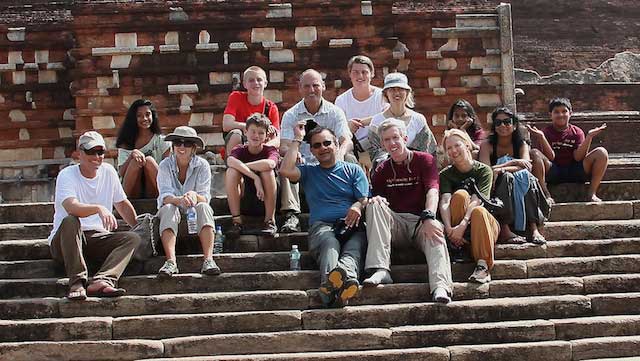
Resettling in Sri Lanka
It’s Monday and we are slated to visit two schools today — one in Pappamodai, the other in Andankulam. Roughly 240 km from Colombo, in the Mannar District, these villages were decimated by 30 years of civil war topped off by the 2004 tsunami. Wild peacocks roam this flat land. Neglected rice paddies await cultivation, await the return of the people who used to call this home.
Having left in 1997, the residents are slowly returning from government camps and relatives’ homes farther south. For now, they have propped up sheets of corrugated metal and large palm fronds to create shelter. The school stands out in stark contrast to these living conditions.
The final half hour of our two hour and 45 minute drive to the Pappamodai Roman Catholic Tamil Mixed School is down a deeply rutted dirt trail. A handful of workers toil in the heat to raise and pave the roadway. We stop at a military checkpoint to show our papers before proceeding. A guard in fatigue pants and jacket and carrying an automatic rifle eyes us suspiciously.
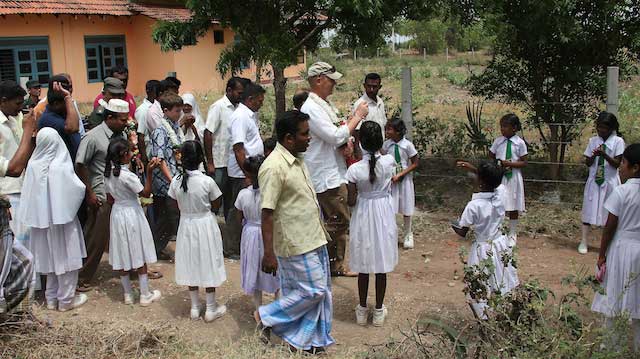
We do stand out in this terrain: two buses filled with adults and children in fresh clothing downing bottles of spring water. Slowly we unload at the first school to gather around a table set with an oil lamp, coconuts, rice, bananas and flowers — symbols of prosperity. We bumble through a welcome ceremony of prayers and lighting candles. Someone blesses us, pins a corsage to our shirts and places a curry-colored bindi spot between our eyebrows before we walk to the new school building.
Teaching up to the ninth grade, the school used to consist of two structures. One was completely destroyed during the war, the other was significantly damaged. And absolutely no furniture was left intact. Discouraged by these conditions, parents didn’t bother to send their children to school.
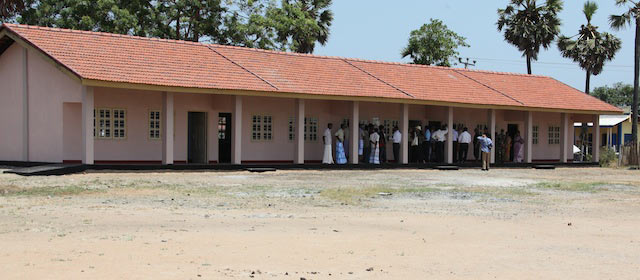
Under a solid roof of wood and tile, five classrooms each enjoy a book cupboard, blackboards, cubbies for students’ backpacks, windows with glass and a solid door. Small tables and chairs are covered with textbooks, paper and pencils — supplied by the ministry of education. The walls are decorated with children’s stories and drawings, posters teaching the alphabet and good hygiene. A broom and dustbin are propped in one corner of the first grade, which only has three boys and three girls. Out front a flowerbed boasts mere sprouts, and a notice board sports more children’s drawings.
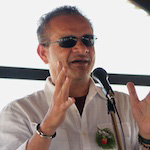
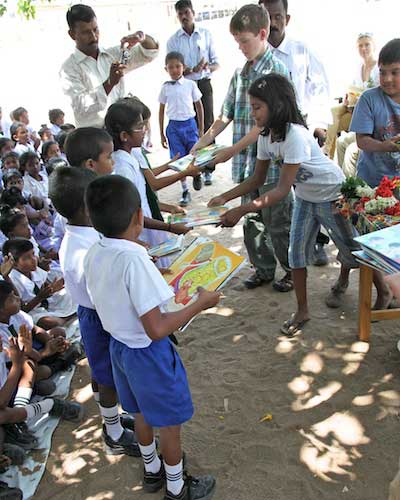
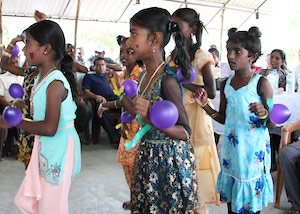
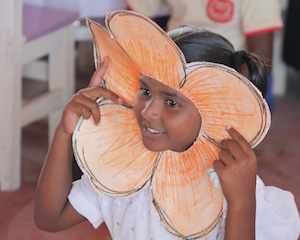
More dances, more welcoming speeches, we close our visit with a game: forming two lines of our children, their children, our parents, their parents we sit and pass a coconut precariously balanced on our ankles from one person to the next. Whichever group is the first to pass the coconut all the way down the line without dropping it wins. There is much laughter, many calls of encouragement in English, Tamil and Swedish. We leave with big smiles on our faces and hope in our hearts. When the village was disbanded there were 250 students. Today there are only 60. The principal tells me they hope to grow it back to 250 as families return to their home.
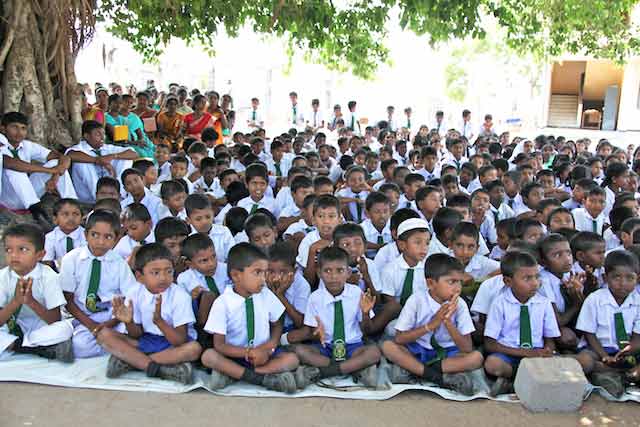
The Andanakulam Roman Catholic Tamil Mixed School, serving approximately 500 families, is very different from Pappamodai’s. After the war, the school was nothing more than an old building with many rooms beyond repair. Classes had to be merged, basic facilities like clean water were non-existent. Ventilation and lighting was poor. As a result, some classes were held outside and had to be cancelled during the rainy season.
But improvements are underway: A two-story building for secondary classes was built after the war; a library for primary and secondary students is the best we’ve ever seen. A science lab is under construction. And the new primary school, donated by the Joseph family, stands clean and proud across the yard.
Starting with the same oil lamp and coconut ceremony, we walk down a corridor of students clapping to welcome us. The children place leis around our necks and straw hats upon our heads, all made by the locals just for our visit.
We gather under a large tree and start with three prayers, one Christian, one Hindu, one Muslim. A young boy from the third grade welcomes us in English, the secretary of the school management committee welcomes us in Tamil. Different classes perform for us, some sing, some dance. These are followed by more speeches, and the Josephs pass out a box of new books for the library.
Interestingly, the army is thanked for their help. It turns out they often pitch in on such projects by clearing and preparing the land for construction. This is not a small undertaking. Before any construction can begin, the land has to be cleared of mines.
Before leaving some of the children in our group are asked to read to some first and second grade students in the library. Three of them take out English language storybooks, simple ones with grand illustrations, and read aloud. The young students sit at their desks, beaming at this novel form of entertainment. We leave with smiles ourselves, feeling good about having shared this small part of their lives.
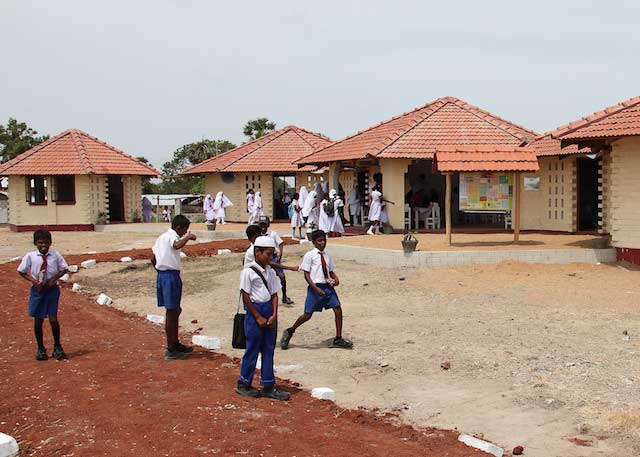
Tuesday morning we head out for a different part of the Mannar District — the villages of Veppankulam and Periya Pollachchi Potkerney. The land is still flat as a savanna but with more densely packed trees than yesterday. We pass a field that the military is clearing of land mines, a stark reminder of what these people have been through and continue to deal with.
Before the conflict began, the Veppankulam Government Muslim Mixed School offered classes up to the 12th grade. When we visit, they only have grades one through six. By the end of 2011, they will offer through the 11th grade, with classes being held in two temporary structures and our new school. Given the poor and crowded conditions of the old facilities, many parents have not bothered sending their children to school. The principal hopes the new building will change that and asks for the funds for more buildings. The village was evacuated in 1990, and people have been returning since 2009. Classes resumed January 2010 with only 10 students. They have around 135 now and enrollment should triple over the next few years.
This school building is like no other we have built. It is not the traditional row of classrooms. It is five separate octagonal structures with lots of windows. Each building serves one grade. Everyone is delighted with the design, but it may not become common unless they can reduce the cost of construction.
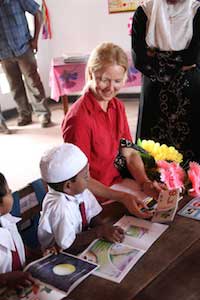
We gather in an open-air hall for welcoming speeches. The district director for education, Ms. Malani, thanks us first in Tamil, then Enlgish: “In 2010, we began with one temporary building — not ideal for teaching. We thank the donors and Room to Read for supporting us to rebuild our lives here after being gone for 21 years. We now have a great environment for learning.”
Following the speeches, most of our group wanders off to visit with families and teachers, or to just walk around the schoolyard. Since this is the school we donated, Al and I sit down with representatives from the construction committee, a group of 13 that includes three women. One of the committee members learned how to make quality cement bricks for this project. He now has customers all over the district. Others learned technology and business systems to monitor the process. So although we set out to just build a school building, the work here has altered lives in other positive ways making us feel good about what we’re doing.
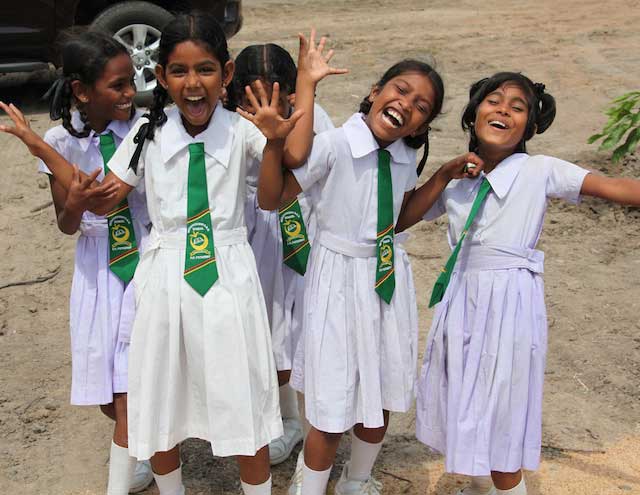
From Veppankulam, we head northwest to the P.P. Potkerney Government Mixed Muslim School. The village of Potkerney is not small. There are 700 Muslim, 75 Christian and 75 Hindu families. As they began to return, two temporary school structures were erected. But the 80 square foot buildings lacked space, light and ventilation, and the grounds had no sanitation facilities. The new primary school, donated by the Spangberg family, is one step toward replacing what the students need.
As we arrive, the greeting committee sets off firecrackers, children hang leis around our necks, and we stop to offer prayers around an oil lamp with rice and coconuts. On our way up to the new school, we stop to plant a mango tree to commemorate our visit.
After a tour of the classrooms, we gather in a central hall for a prayer, welcome speeches, dances and singing. Just as the deputy director of education for the district stands to say something, someone’s cell phone begins to ring. It’s a different ringtone, a melody that sounds something like “It’s A Small World” from Disney. How appropriate, I think to myself.
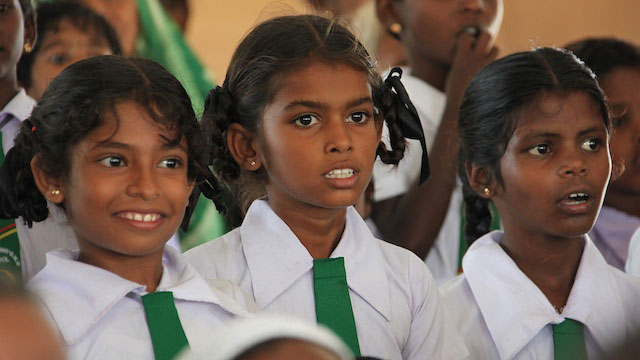
One speaker turns out to be a member of the Sri Lankan parliament. He is here today because he grew up in this town and represents what education can mean to a family. Speaking first in Tamil then English, he says, “Thank you for your generosity. I am sure you have expectations, like my own, that these children grow up to give to and do good in society.… In Islam there is a saying that if a man gives to education, he will never die. Each for all, all for each, we must live. If anybody donates to others, he is doing God’s work.”
In closing the Spangbergs (Kjell, Lisa and their two sons), pass out a box of storybooks from Room to Read. Then Kjell closes a short speech with some advice for the children: “Study really hard; read and build a foundation for the rest of your lives; listen to your teachers and do your homework; have dreams; and give back to your community.”
Maybe, just maybe, thanks to all the support for education, some of these kids will be able to start having dreams of a life beyond subsistence.









